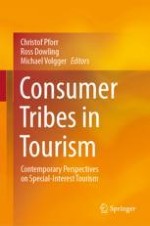2021 | OriginalPaper | Buchkapitel
10. Freedom Campers: A New Neo-Crowd (-Tribe) Breaking Tradition with Planning Boundaries
verfasst von : Rodney W. Caldicott
Erschienen in: Consumer Tribes in Tourism
Verlag: Springer Singapore
Aktivieren Sie unsere intelligente Suche, um passende Fachinhalte oder Patente zu finden.
Wählen Sie Textabschnitte aus um mit Künstlicher Intelligenz passenden Patente zu finden. powered by
Markieren Sie Textabschnitte, um KI-gestützt weitere passende Inhalte zu finden. powered by
